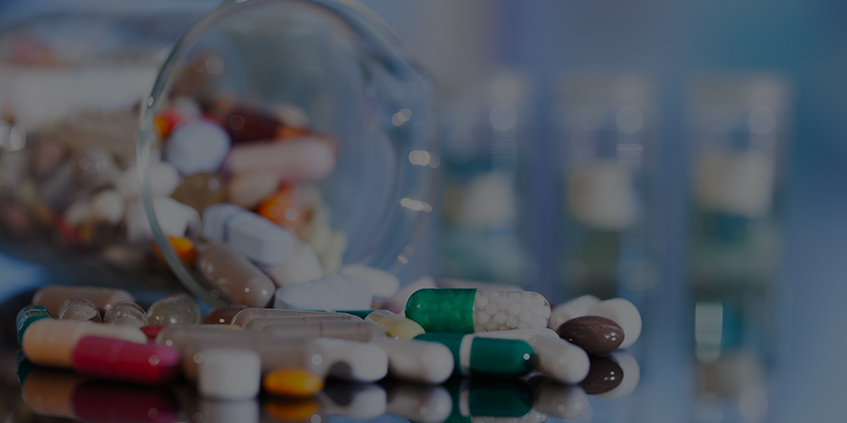Pharmaceutical Industry

Indian Pharmaceutical Industry
- Indian pharmaceutical sector is expected to grow to US$ 100 billion, while medical device market is expected to grow US$ 25 billion by 2025.
- India’s cost of production is nearly 33 per cent lower than that of the US.
- Labour costs are 50–55 per cent cheaper than in Western countries. The cost of setting up a production plant in India is 40 per cent lower than in Western countries.
- Cost-efficiency continues to create opportunities for Indian companies in emerging markets & Africa.
- India has the 2nd largest number of USFDA-approved manufacturing plants outside the US.
- India has 2,633 FDA-approved drug products. India has over 546 USFDA-approved company sites, the highest number outside the US.
- Growing per capita sales of pharmaceuticals in India offers ample opportunities for players in this market.
- Economic prosperity would improve affordability for generic drugs in the market & improve per capita sales of pharmaceuticals in India.
Introduction
India is the largest provider of generic drugs globally. Indian pharmaceutical sector supplies over 50 per cent of global demand for various vaccines, 40 per cent of generic demand in the US and 25 per cent of all medicine in the UK.
India enjoys an important position in the global pharmaceuticals sector. The country also has a large pool of scientists and engineers with a potential to steer the industry ahead to greater heights. Presently, over 80 per cent of the antiretroviral drugs used globally to combat AIDS (Acquired Immune Deficiency Syndrome) are supplied by Indian pharmaceutical firm
Market Size Pharmaceutical Sector in India
- Pharmaceuticals export from India stood at US$ 20.70 billion in FY20. Pharmaceutical export include bulk drugs, intermediates, drug formulations, biologicals, Ayush and herbal products and surgical.
- India's biotechnology industry comprising biopharmaceuticals, bio-services, bio-agriculture, bio-industry, and bioinformatics is expected grow at an average growth rate of around 30 per cent a y-o-y to reach US$ 100 billion by 2025.
- India’s domestic pharmaceutical market turnover reached Rs 1.4 lakh crore (US$ 20.03 billion) in 2019, up 9.8 per cent y-o-y from Rs 129,015 crore (US$ 18.12 billion) in 2018.
Recent developments/investments in the Indian pharmaceutical sector
- In May 2020, Jubilant Generics Ltd entered into a non-exclusive licencing agreement with US-based Gilead Sciences Inc to manufacture and sell the potential COVID-19 drug Remdesivir in 127 countries, including India.
- Affordable medicines under Pradhan Mantri Bhartiya Janaushadhi Pariyojana (PMBJP) achieved record sales turnover of Rs 52 crore (US$ 7.38 million) in the month of April 2020.
- During December 2019, on moving annual total (MAT) basis, industry growth was at 9.8 per cent, with price growth at 5.3 per cent, new product growth at 2.7 per cent, while volume growth at two per cent y-o-y.
- In October 2019, Telangana Government proposed Hyderabad Pharma City with financial assistance from the Central government of Rs 3,418 crore (US$ 489 million).
- As on August 2019, the moving annual turnover (MAT) for biosimilar molecules sold in the domestic market stood at Rs 1,498 crore (US$ 214.31 million).
- Healthcare sector witnessed private equity of total US$ 1.1 billion with 27 deals in H12019.
- Indian pharmaceutical industry’s export to the US will get a boost as branded drugs worth US$ 55 billion will become off-patent during 2017-2019.
Some of the initiatives taken by the Government to promote the pharmaceutical sector
- India plans to set up a nearly Rs 1 lakh crore (US$ 1.3 billion) fund to provide a boost to companies to manufacture pharmaceutical ingredients domestically by 2023.
- In November 2019, the Cabinet approved extension/renewal of extant Pharmaceuticals Purchase Policy (PPP) with the same terms and conditions while adding one additional product namely, Alcoholic Hand Disinfectant (AHD) to the existing list of 103 medicines till the final closure/strategic disinvestment of Pharma CPSUs.
- Under Budget 2020-21, Rs 65,012 crore (US$ 9.30 billion) has been allocated to the Ministry of Health and Family Welfare is. The Government has allocated Rs 34,115 crore (US$ 4.88 billion) towards the National Health Mission under which rural and urban people will get benefited.
- Rs 6,400 crore (US$ 915.72 million) has been allocated to the health insurance scheme Ayushman Bharat – Pradhan Mantri Jan Arogya Yojana (AB-PMJAY).
- As per Economic Survey 2019-20, Government expenditure (as a percentage of GDP) increased to 1.6 per cent in FY20 from 1.2 per cent in FY15 on health.
- The National Health Protection Scheme is the largest Government-funded healthcare programme in the world, which is expected to benefit 100 million poor families in the country by providing a cover of up to Rs 5 lakh (US$ 7,723.2) per family per year for secondary and tertiary care hospitalisation. The programme was announced in Union Budget 2018-19.
- Government of India unveiled 'Pharma Vision 2020' to make India a global leader in end-to-end drug manufacture. Approval time for new facilities has been reduced to boost investment.
Road Ahead
Medicine spending in India is projected to grow 9-12 per cent over the next five years, leading India to become one of the top 10 countries in terms of medical spending.
Going forward, better growth in domestic sales would also depend on the ability of companies to align their product portfolio towards chronic therapies for diseases such as cardiovascular, anti-diabetes, anti-depressants and anti-cancers, which are on the rise.
The Indian Government has taken many steps to reduce costs and bring down healthcare expenses. Speedy introduction of generic drugs into the market has remained in focus and is expected to benefit the Indian pharmaceutical companies. In addition, the thrust on rural health programmes, lifesaving drugs and preventive vaccines also augurs well for the pharmaceutical companies.
References: Consolidated FDI Policy, Press Information Bureau (PIB), Media Reports, Pharmaceuticals Export Promotion Council, AIOCD-AWACS, IQVIA
Disclaimer: This information has been collected through secondary source and ASC is not responsible for any errors in the same.
